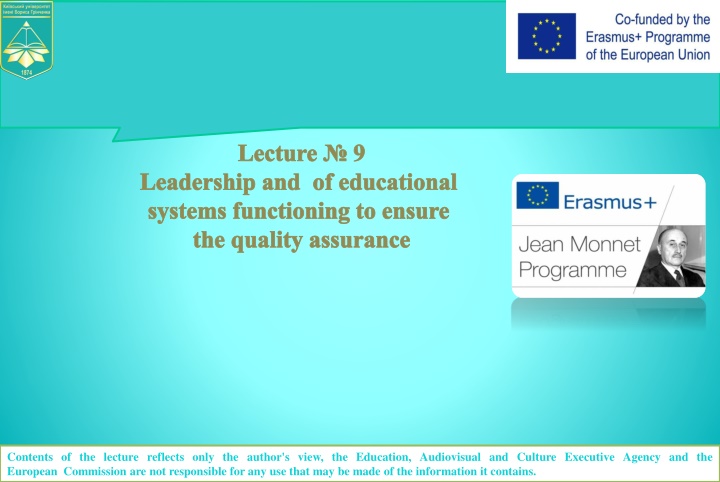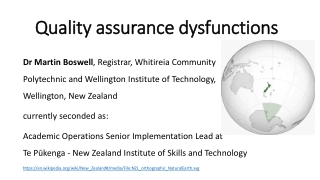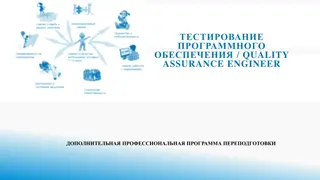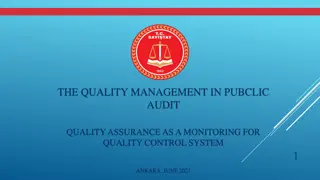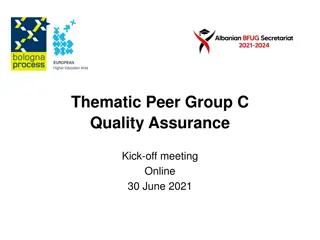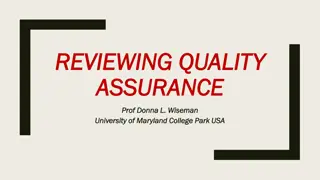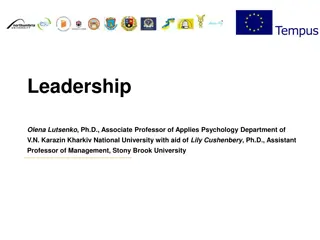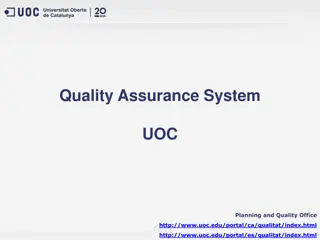Leadership in Educational Systems for Quality Assurance
The lecture delves into the role of universities in developing society's leadership potential, European Union educational policy priorities, and functions of university education. It emphasizes research directions in higher education and the critical role universities play in societal development.
Uploaded on Mar 13, 2025 | 1 Views
Download Presentation

Please find below an Image/Link to download the presentation.
The content on the website is provided AS IS for your information and personal use only. It may not be sold, licensed, or shared on other websites without obtaining consent from the author.If you encounter any issues during the download, it is possible that the publisher has removed the file from their server.
You are allowed to download the files provided on this website for personal or commercial use, subject to the condition that they are used lawfully. All files are the property of their respective owners.
The content on the website is provided AS IS for your information and personal use only. It may not be sold, licensed, or shared on other websites without obtaining consent from the author.
E N D
Presentation Transcript
Lecture 9 Leadership and of educational systems functioning to ensure the quality assurance Contents of the lecture reflects only the author's view, the Education, Audiovisual and Culture Executive Agency and the European Commission are not responsible for any use that may be made of the information it contains.
Plan The role of the university in developing the leadership potential of society World research infrastructure for comparative research in higher education European education systems (for example, Great Britain and Germany) European Union educational policy Activities of international organizations in the field of comparative studies in education
The role of the university in developing the leadership potential of society The University of the 21st Century is the main social institution of modern society New Functions: organization and conducting of joint international fundamental research; serving the needs of society with providing the highly skilled workers; development of continuous education o Scientific substantiation of the processes of state formation o Creation of a progressive model of social development The decisive role of universities in developing the leadership potential of society
European Union educational policy Priority directions of research in the field of higher education: development of theoretical foundations for the formation of a universal area of vocational education and training in Europe; construction of the system of analysis of enterprises' contributions to the system of vocational education, taking into account organizational, managerial and technological components; the study of the nature of "skills and jobs", which could be guided by policies in the private and public sectors; Creation of models of interaction between professional and general education and development of human resources; the study of nature, technology and forms of non-formal learning.
European Union educational policy The main functions of university education: Ensuring academic mobility of students and teachers; development of a democratic society Functions of university education: Social function Inclusion of universities in market relations, the formation of national, European and world market of scientific and educational services Economical function Students learn to be citizens, aware of their rights and responsibilities Political function Providing technological advances to the formation of a multidimensional open mind Technological function
European Union educational policy Large, multifunctional institutions of higher education with high scientific and pedagogical potential Classical university Models of a university organization University - science - production Creation of scientific parks, technolys, technoparks in the structure of the university as a system A system of educational process and research is built up, united by a single concept and methodology Corporate University The union of existing branch institutes and research institutions based on the classical university University complex Opening of study programs in a large-scale virtual project Virtual University
European Union educational policy European Educational Space Factors: strengthening of globalization tendencies (economic, technological, political, socio- cultural); the internationalization of higher education and the creation of a pan-European space of higher education (ENEA) and the pan-European space of scientific research (ERA); the development of market relations and the inclusion of institutions of higher education; creation of technoparks, technopolises and other research structures on the basis of higher education institutions; the development of democracy and civil society; increasing student and teacher mobility; introduction of pan-European educational standards.
Main trends in education system development in Germany variational approach; an emphasis on modern science achievements and innovative processes in the field of practical activity; introduction of innovative learning technologies; autonomy of higher educational establishments; international integration; preparation of future specialists for practical activity at the macro level, for teaching at a higher educational institution or for continuing doctoral studies.
Main trends in education system development in Great Britain Higher education in the United Kingdom is provided by 157 HEIs. The United Kingdom's higher education sector brings about 2.3% of its GDP to the state's economy. The United Kingdom, in terms of the degree of international integration, is the second one after the United States. The United Kingdom's higher education system is established and operates on the principles of academic freedom and university autonomy. The United Kingdom has a high level of institutional autonomy, self-determination of entry requirements, training programs, research directions, and staffing policies. British HEIs do not belong to the Government and are not managed by it. All UK Overseas Departments receive some public funding through a number of funding tips. A diversified and result-oriented financing mechanism is constantly being improved to improve the effectiveness of the HEI. Another key feature of the UK's higher education system is the integration of teaching and research activities.
Contents of the lecture reflects only the author's view, the Education, Audiovisual and Culture Executive Agency and the European Commission are not responsible for any use that may be made of the information it contains.
